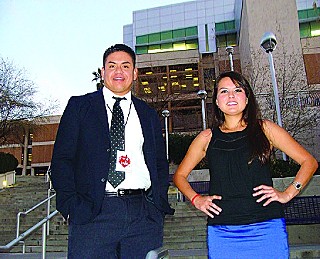What is believed to be the only student-run Native American magazine in the country will no longer be part of the UA's American Indian Studies Department.
About six months after Red Ink magazine published its 20th anniversary issue, its managing editor received a notice on Tuesday, Aug. 2, that the department will no longer sponsor or oversee production of the magazine.
No one is more shocked by the decision than the magazine's managing editor, Joseph Quintana Ramirez, a UA grad student and member of the Santo Domingo Pueblo, who joined the Red Ink staff in 2009. The last time the Tucson Weekly talked to Ramirez, he and the other student volunteers were excited the anniversary issue was finally going to press after the students raised more than $5,000 to pay for production and promotion materials. (See "Part of the Conversation," March 10.)
Ramirez says he was surprised to learn that the AIS Department had concerns about Red Ink, because they'd never come up in previous conversations. "People have said to me, 'You've got to have seen this coming,' but really I didn't."
The letter of severance was signed by Ronald L. Trosper, the new AIS head. Trosper told the Weekly that there were some discussions about severing ties with the magazine before he became the head of the department.
"I am new at the department, but this change came on the advice of the previous department head (Joseph Hiller). I felt I was carrying out what had already been discussed," Trosper says.
"There are specific issues we shared in the (severance) letter. First, we had a record number of errors and not giving credit to authors" in the last issue. "Second, we don't have a faculty member who wants to support them (as a faculty adviser). Third, we're concerned that students, when they prioritize, choose Red Ink over their academic work. Of course, they are free to do that, but I don't think AIS should put the distraction in front of them. It's a distraction we should not support."
Trosper says the final concern is controlling costs. AIS donated $2,500 for the 20th anniversary issue, but the full-color glossy magazine ended up costing $8,000 to publish. "We've contributed funds, and they've also raised funds, but I haven't seen a financial report," Trosper says.
On Wednesday, Aug. 3, Trosper met with Ramirez, along with student volunteers and AIS students Ashley Tsosie-Mahieu and Johnny Nelson. Ramirez says that AIS officials want the magazine out of its office space on Helen Street by Sept. 15. "We have to inventory our magazines and equipment, and find storage. That's not enough time," Ramirez says.
Trosper told the students he'd work with them on the move-out date. Also, an e-mail he sent to all AIS students makes it seem like there may be room for negotiations that could keep Red Ink within the AIS Department, rather than as a student club, as Trosper originally suggested.
In the e-mail, which the AIS Department head shared with the Weekly, he apologized to the students for not discussing the concerns before sending the letter to Ramirez.
"I apologized for not doing so, and I have offered to meet further to discuss the matter, which can go as far as reconsidering the decision," he wrote.
However, Ramirez says he hasn't received anything directly from Trosper that says the department could be reconsidering the severance. He also questions Trosper's concerns, particularly the claim that involvement in Red Ink is preventing academic progress of student volunteers. "We have several staff members who maintain 4.0 averages," he says.
One of the corrections Trosper refers to was the magazine's failure to cite an author who didn't submit a biography for the anniversary issue. "We were trying to work to correct it, but before we could, the department had written (the writer) back that they were going to correct it," Ramirez says.
Regarding costs, Ramirez says Red Ink did receive $2,500 in support from the AIS Department, but the remaining money to publish and promote the anniversary issue was raised by the student editorial board.
"I never heard displeasure, like, 'We don't like your practices or how you're spending money,'" Ramirez says.
Red Ink's severance comes after a tumultuous period for the AIS Department. This spring, some Native American students complained that a graduate-assistantship position was always going to non-Native American students when equally qualified Native American students were passed up.
Ramirez says he didn't get deeply involved in the issue. However, one day in May, he showed up just as the department was having a town hall meeting to discuss the GA appointment policy. Later, Ramirez says, he was notified that he was being investigated for bullying and intimidation—even though he merely showed up to that meeting and voiced his concerns.
He's since been cleared of the allegations, but the issue delayed him from completing his graduate degree. The allegations, according to Ramirez, came from outgoing AIS department head Hiller and associate professor Franci Washburn.
In an e-mail to the Weekly, Hiller says that Red Ink's future has been a part of department discussions going back six years, but the corrections on the 20th anniversary issue "with quality control problems, non-responsiveness with regard to corrective action and legal liabilities probably provided some momentum for the letter."
Regarding the graduate-assistantship controversy, Hiller wrote, "In this case, a non-Indian was appointed. A few students made a fuss about that, and their behavior/conduct got a little out of hand. Thus the complaints by students and faculty; and investigations conducted by the dean of students."
Hiller wrote that he met with faculty members and wrote a memo to clarify the selection criteria, which include academic achievement and writing ability. "The faculty (members) do not and cannot discriminate in these decisions based on protected categories of gender, race or veterans' status. Incredibly, some students feel otherwise."











